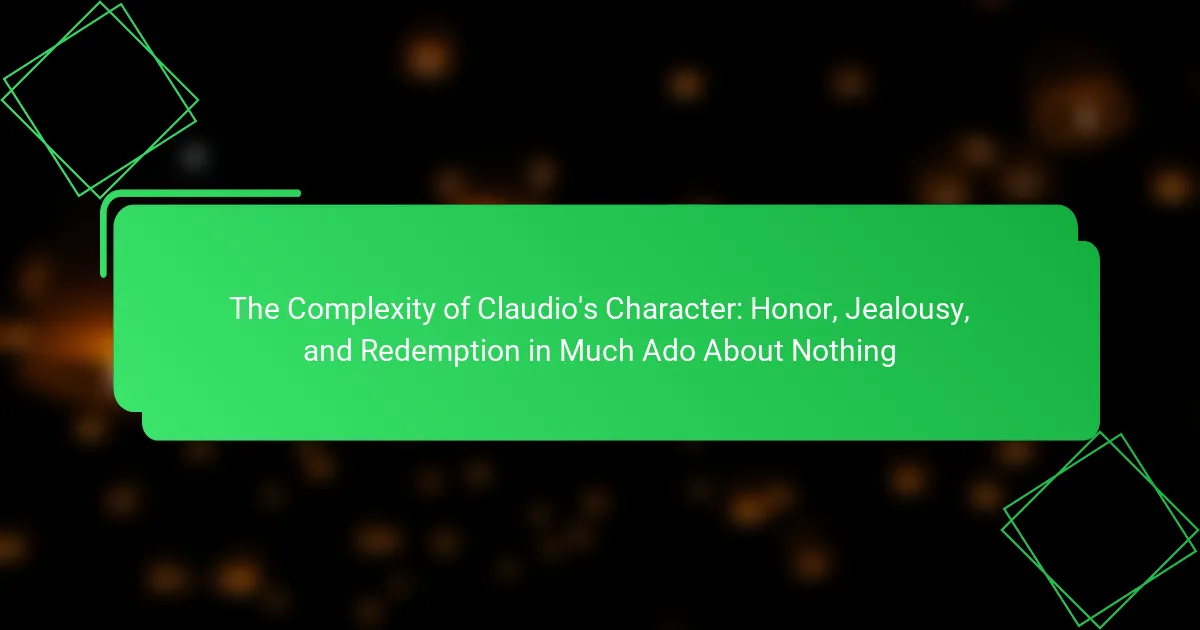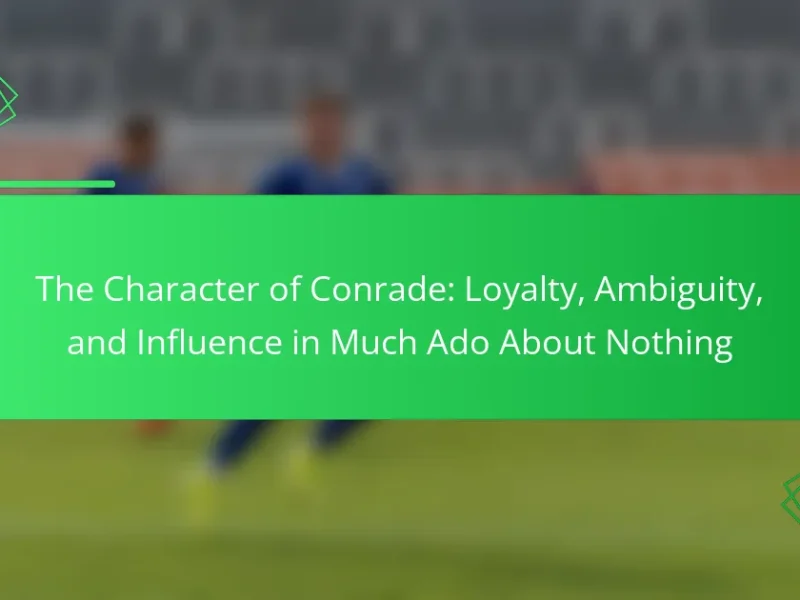
What makes Claudio’s character complex in Much Ado About Nothing?
Claudio’s character is complex due to his conflicting values of honor and love. He is deeply concerned with his reputation, which drives many of his actions. His jealousy leads him to doubt Hero’s fidelity without substantial evidence. This impulsive behavior results in public shaming of Hero, showcasing his vulnerability to manipulation. Claudio’s actions reflect a struggle between romantic ideals and societal expectations. His eventual remorse indicates a capacity for growth and redemption. This duality makes him a multifaceted character within the narrative.
How do honor and jealousy shape Claudio’s actions?
Honor and jealousy significantly influence Claudio’s actions throughout “Much Ado About Nothing.” Claudio’s sense of honor drives him to seek social validation and reputation. He feels humiliated when he believes that his betrothed, Hero, has been unfaithful. This perceived dishonor leads him to publicly shame Hero at their wedding. Jealousy intensifies Claudio’s reaction, clouding his judgment and leading to impulsive decisions. His jealousy stems from his deep emotional investment in Hero and fear of losing her. The combination of honor and jealousy creates a destructive cycle, resulting in serious consequences for all characters involved.
What specific events highlight Claudio’s sense of honor?
Claudio’s sense of honor is highlighted when he publicly shames Hero at their wedding. He believes she has been unfaithful, which reflects his commitment to reputation. His actions stem from a misguided sense of justice and honor. Another event is his remorse after realizing Hero’s innocence. This guilt indicates his internal conflict between honor and love. Claudio’s willingness to marry Hero’s cousin, despite his previous actions, also emphasizes his complex understanding of honor. These events collectively illustrate Claudio’s struggle with honor, jealousy, and redemption.
How does jealousy influence Claudio’s decisions regarding Hero?
Jealousy significantly influences Claudio’s decisions regarding Hero. Claudio’s jealousy arises from his insecurities and societal expectations. He becomes suspicious of Hero’s fidelity. This suspicion leads him to publicly shame Hero at their wedding. Claudio’s actions are driven by a desire to protect his honor. His jealousy clouds his judgment and leads to impulsive decisions. He later regrets these actions, showcasing his internal conflict. Claudio’s jealousy ultimately complicates his relationship with Hero and highlights his character flaws.
What role does redemption play in Claudio’s character arc?
Redemption plays a crucial role in Claudio’s character arc. Initially, Claudio succumbs to jealousy and dishonor, leading to public humiliation of Hero. This act sets the stage for his need for redemption. Claudio’s journey reflects his internal struggle and eventual realization of his mistakes. He grapples with guilt and seeks forgiveness from Hero. The resolution occurs when he acknowledges his wrongdoings and accepts responsibility. Ultimately, redemption transforms Claudio from a flawed character to one capable of love and honor. This arc emphasizes the themes of forgiveness and the possibility of personal growth within the narrative.
How does Claudio seek redemption after his mistakes?
Claudio seeks redemption by publicly acknowledging his wrongs and expressing remorse. He feels guilt for falsely accusing Hero of infidelity. Claudio attempts to make amends through a public declaration of his love for Hero. He later agrees to marry Hero’s cousin as a way to honor his commitment. Claudio’s actions reflect his desire to restore his honor and seek forgiveness. His journey demonstrates the struggle between pride and the need for redemption. Ultimately, Claudio’s path to redemption is marked by his realization of the consequences of his actions.
What are the consequences of Claudio’s quest for redemption?
Claudio’s quest for redemption leads to significant personal and relational consequences. His initial actions result in the public shaming of Hero, causing a rift between them. This act of jealousy and dishonor deeply impacts Hero’s reputation and emotional state. Claudio’s desire for redemption drives him to seek forgiveness but also highlights his internal conflict. His journey reveals the fragility of trust in relationships. Ultimately, Claudio’s quest culminates in a public acknowledgment of his mistakes. This acknowledgment restores some honor but also underscores the lasting impact of his earlier actions. The consequences reflect the complexities of honor, jealousy, and the possibility of redemption within human relationships.

How does Claudio’s complexity compare to other characters?
Claudio’s complexity is moderate compared to other characters in “Much Ado About Nothing.” His motivations are primarily driven by honor and jealousy. Unlike Beatrice, who exhibits strong independence and wit, Claudio’s character is more reactive. He often succumbs to societal pressures, particularly regarding honor. This contrast highlights his vulnerability. Additionally, characters like Benedick display greater emotional depth and growth. Claudio’s journey towards redemption is significant but less nuanced than others. Overall, Claudio serves as a foil to more complex characters, emphasizing themes of honor and emotional conflict.
In what ways do Claudio and Benedick’s characters contrast?
Claudio and Benedick contrast significantly in their views on love and honor. Claudio is impulsive and easily swayed by jealousy. He quickly doubts Hero’s fidelity and publicly shames her. This act stems from his obsession with honor and reputation. Benedick, on the other hand, is skeptical of love at the beginning. He values friendship and wit over romantic entanglements. Benedick’s character evolves as he falls for Beatrice, showcasing a deeper emotional capacity. Unlike Claudio, Benedick is capable of introspection and growth. Their contrasting approaches to love highlight the themes of honor and trust in the play.
What attributes make Benedick a foil to Claudio?
Benedick serves as a foil to Claudio through contrasting attributes. Benedick is characterized by his wit and skepticism about love. In contrast, Claudio is romantic and idealistic, believing in the purity of love. Benedick’s independence and reluctance to commit highlight Claudio’s dependence on societal approval and honor. Claudio’s jealousy and insecurity are evident when he doubts Hero’s fidelity. Benedick, however, demonstrates loyalty and ultimately supports love despite his earlier cynicism. This contrast emphasizes Claudio’s internal struggles with honor and jealousy, showcasing his complexity as a character.
How do their perspectives on love differ?
Claudio and Benedick have differing perspectives on love. Claudio views love as a means to gain social status and validation. His love for Hero is heavily influenced by her beauty and societal expectations. In contrast, Benedick approaches love with skepticism and humor. He initially dismisses romantic relationships as foolish. Claudio’s love is possessive and idealized, while Benedick’s perspective evolves into a more genuine appreciation for companionship. This contrast highlights Claudio’s insecurity and Benedick’s growth. Their differing views reflect the complexity of love in “Much Ado About Nothing.”
What similarities and differences exist between Claudio and Don John?
Claudio and Don John share some similarities, but they differ significantly in their motivations and actions. Both characters exhibit jealousy, but Claudio’s jealousy stems from love and honor, while Don John’s jealousy is rooted in spite and malice. Claudio seeks validation through his relationship with Hero, reflecting his desire for honor. In contrast, Don John actively undermines others, showcasing his desire for chaos. Claudio’s actions are influenced by societal expectations, while Don John’s actions are driven by personal vendetta. Ultimately, Claudio seeks redemption, especially after realizing his mistakes, whereas Don John remains unrepentant and destructive throughout the play. This contrast highlights the complexity of human motivations and the consequences of jealousy in “Much Ado About Nothing.”
How do their motivations drive the plot in different ways?
Claudio’s motivations drive the plot through themes of honor, jealousy, and redemption. His desire for honor leads him to publicly shame Hero, impacting their relationship. Jealousy fuels his suspicion of her fidelity, causing impulsive actions that escalate conflicts. Claudio’s journey towards redemption emerges when he learns of Hero’s innocence, prompting his regret and desire for reconciliation. Each motivation shapes his interactions and influences the narrative’s progression, highlighting the consequences of misguided actions. This interplay creates tension and ultimately drives the resolution of the plot.
What does their rivalry reveal about Claudio’s character?
Claudio’s rivalry reveals his deep-seated insecurities and obsession with honor. His actions are driven by jealousy and a need to assert his status. Claudio’s quickness to believe the worst about others highlights his lack of trust. He is easily manipulated, showcasing his vulnerability. This rivalry also illustrates his struggle between love and pride. Claudio’s behavior reflects a fear of being wronged, leading to rash decisions. Ultimately, his character is shaped by the tension between his desires and societal expectations.

What themes are explored through Claudio’s character development?
Claudio’s character development explores themes of honor, jealousy, and redemption. Honor is central to Claudio’s motivations, influencing his actions and decisions. His perception of honor leads him to publicly shame Hero, reflecting societal expectations. Jealousy emerges as a driving force, particularly in his reaction to perceived infidelity. This jealousy clouds his judgment and results in significant consequences. Redemption becomes a key theme as Claudio grapples with guilt and seeks forgiveness. His journey illustrates the complexities of human emotions and societal pressures. The interplay of these themes shapes Claudio’s growth and highlights the moral dilemmas he faces.
How does the theme of honor manifest in Claudio’s journey?
The theme of honor manifests in Claudio’s journey through his actions and decisions regarding love and reputation. Claudio initially values honor highly, which influences his perception of Hero. He believes that her fidelity is paramount to his honor. When he is misled into thinking Hero has been unfaithful, Claudio publicly shames her at their wedding. This act stems from his desire to protect his honor, showcasing how deeply intertwined his identity is with societal perceptions. Ultimately, Claudio’s journey reflects a struggle between personal honor and the consequences of his actions. His eventual redemption comes when he realizes his mistake and seeks to restore Hero’s honor, illustrating a complex relationship with the theme of honor throughout the narrative.
What societal expectations influence Claudio’s actions regarding honor?
Claudio’s actions regarding honor are influenced by societal expectations of masculinity and reputation. In the context of Elizabethan society, honor is closely tied to a man’s public image and social standing. Claudio feels pressured to conform to these ideals, believing that his worth is determined by how others perceive him. His reaction to perceived dishonor from Hero reflects a societal belief that a woman’s fidelity directly impacts a man’s honor. This belief drives Claudio to publicly shame Hero, as he fears that his own reputation is at stake. The societal expectation for men to defend their honor leads Claudio to act impulsively, prioritizing public perception over personal relationships.
How does Claudio’s understanding of honor evolve throughout the play?
Claudio’s understanding of honor evolves from a superficial view to a more nuanced perspective. Initially, he equates honor with public perception and reputation. Claudio’s jealousy over perceived infidelity leads him to shame Hero publicly at their wedding. This act reflects his rigid adherence to societal standards of honor. However, as the play progresses, Claudio grapples with the consequences of his actions. He experiences remorse and seeks redemption after realizing Hero’s innocence. In the end, Claudio’s understanding of honor matures to encompass forgiveness and personal integrity. This evolution highlights the complexity of his character and the theme of honor in the play.
What insights can we gain about jealousy from Claudio’s experiences?
Claudio’s experiences reveal that jealousy can lead to impulsive actions and decisions. His jealousy towards Don Pedro’s perceived interest in Hero drives him to publicly shame her. This act reflects how jealousy can distort one’s judgment and lead to the destruction of relationships. Claudio’s quickness to believe in Hero’s infidelity demonstrates the fragility of trust. Furthermore, his jealousy showcases the societal pressures surrounding honor and reputation. Claudio’s actions ultimately lead to feelings of regret, illustrating that jealousy can result in personal turmoil. His journey highlights the importance of communication in overcoming jealousy.
How does jealousy affect Claudio’s relationships with other characters?
Jealousy significantly strains Claudio’s relationships with other characters. Claudio’s jealousy primarily targets Benedick and Don Pedro. He feels threatened by their close friendship with Hero. This jealousy leads him to doubt Hero’s fidelity. Claudio’s public shaming of Hero at their wedding illustrates the destructive power of his jealousy. His actions cause deep emotional pain to Hero and alienate their friends. Claudio’s jealousy ultimately results in a loss of trust and respect from those around him. This dynamic showcases how jealousy can distort perceptions and damage relationships.
What lessons can be learned from Claudio’s jealousy and its impact?
Claudio’s jealousy teaches the dangers of impulsive judgment and the fragility of trust. His quickness to believe the worst about Hero results in public humiliation and emotional turmoil. This reaction illustrates how jealousy can distort perception and lead to regrettable actions. Claudio’s behavior emphasizes the importance of communication and understanding in relationships. It highlights that unchecked jealousy can destroy bonds and cause irreparable harm. The impact of his jealousy serves as a cautionary tale about the consequences of allowing insecurities to dictate actions. Ultimately, it reveals that jealousy can overshadow love and respect, undermining the foundation of a relationship.
What practical lessons can be drawn from Claudio’s character in Much Ado About Nothing?
Claudio’s character in Much Ado About Nothing teaches the importance of communication and trust in relationships. His quickness to believe rumors leads to misunderstandings. For instance, he publicly shames Hero based on false accusations. This act illustrates the danger of jealousy and rash judgment. Claudio’s journey also highlights the potential for redemption. He ultimately seeks forgiveness from Hero, showing that relationships can be repaired. His character arc emphasizes the need for honesty and openness to avoid conflict. Trust is essential for a healthy relationship, as demonstrated by Claudio’s initial failure.
The main entity of the article is Claudio’s character in “Much Ado About Nothing.” The article explores the complexity of Claudio’s character through the themes of honor, jealousy, and redemption. It details how Claudio’s conflicting values drive his actions, particularly his impulsive behavior stemming from jealousy and societal expectations. Key events illustrating his sense of honor and the consequences of his actions are discussed, alongside his journey toward redemption and the impact of his jealousy on relationships. The article also compares Claudio’s character to others in the play, highlighting the nuances of his motivations and development.


